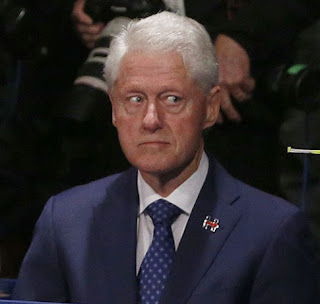Election 2016: Texas Elector gone Wild
By James Baxley
Chris Suprun, the Republican Texas
elector who, against the will of the Texas voters, refuses to cast his vote for
the man Texas voters have decided to trust as their President, Donald Trump.
Suprun should follow fellow Texan elector Art Sisneros, who has already
resigned from the state’s Electoral College delegation on grounds that Trump
does not meet his religious and moral principles.
RELATED: Election 2016: Texas Elector Art Sisneros Resigns
Speaking of illegal acts: a faithless
elector runs the risk of party censure and political retaliation as well as
potential legal penalties in some states. Although these penalties have never
been enforced, twenty-nine states plus the District of Columbia have laws to
penalize faithless electors, Instead of penalizing a faithless elector,
some states, such as Michigan and Minnesota, specify the faithless elector's
vote is void.
Trump may lack foreign policy
experience, but a good president would surround himself with people who are
experts in specific fields and can guide the president. But what bothers me is
Suprun’s comment “This encouragement of an illegal act . . . troubles me.” Doesn’t
Suprun know that Trump would still be elected President even if enough electors
follows his lead and let’s say these electors vote for Kaisch.
 |
| Chris Suprun |
The House of Representatives will then
have the say in who will become the President. Since the House is majority
Republican Trump would still be elected as the next President. But let’s say
Clinton gets elected by the House, doesn’t her past such as “Travelgate,” her
commodities trading, her influence over her husband’s controversial late-term
pardons, her email server, and Benghazi to name a few trouble you?
The New York Times published a story in the March of 1994 issue on
Clinton’s “commodity trades from 1978 and 1979.” She turned an initial
investment of $1,000 into nearly $100,000.
It was reported in March 2015, that
Clinton had been using a private server as secretary of State. Initially said
there were no classified information on her server, though a government review
later determined some of the emails contained information retroactively marked
classified. Clinton's email debacle dragged on throughout her presidential
campaign and the reopening of the case in the final weeks is thought to be
(falsely by her and most of the DNC) why she lost.
In Suprun’s op-ed, he points out that
“Mr. Trump does not understand that the Constitution expressly forbids a
president to receive payments or gifts from foreign governments.” It appears
that Mr. Suprun is so uninformed that he apparently hasn’t heard about the
controversies surrounding the Clinton Foundation.
ALSO READ: Faithless Elector, 9/11, and Stolen Valor
ALSO READ: Faithless Elector, 9/11, and Stolen Valor
In a response to a question from Chris
Wallace about possible conflicts of interest and impropriety of the Clinton
Foundation, Democratic presidential nominee Hillary Clinton vigorously defended
the Clinton Foundation’s work. “I’m thrilled to talk about the Clinton
Foundation, because it is a world-renowned charity and I am so proud of the
work that it does.”
The Clinton Foundation took donations
from foreign governments such as Algeria, Kuwait, Qatar, and Oman which would
amount to between $19.3 million and $55.7 million.
Donations in turn influenced Clinton’s
decision making while serving as secretary of state. In 2008, Saudi Arabia
donated around $10 million to $25 million, along with an additional $1 million
to $5 million donation from the “Friends of Saudi Arabia,” (cofounded by a
Saudi prince). Some donations came as recently as 2014 when Clinton prepared
her run for the presidency.
Clinton arranged for her foundation to
host a meeting in Morocco on behalf of a Moroccan state-owned mining company in
return for a $12 million donation from King Mohammed VI of Morocco.
Canadian businessman and billionaire
mining magnate Frank Giustra funneled millions of dollars to the foundation
while Clinton was secretary of state.
In 2005, Bill Clinton and Giustra
visited Kazakhstan. Giustra’s goal was to buy uranium mines in Kazakhstan. He
and Bill met with leaders of the Kazakhstan government and got major mining
concessions approved by the Kazakhstan government. The Clintons received a $31
million donation to their Foundation from Giustra, along with a pledge to
donate $100 million more.
The historic documents that lay out
the principles behind the Electoral College system, the Federalist Papers
describes what each elector should look for when casting their votes. The
candidates must be “qualified, not engaged in demagogy, and independent from
foreign influence.”
During the third and final
presidential debate, the Republican nominee Trump flat out accuses the Democratic
nominee Clinton of paying people to incite violence at his rallies. Many people
disagreed with him and said he was being hyperbolic but when Project Veritas
released the undercover film “Rigging the Election,” it proved Trump to be
correct.
Scott Foval, the National Director at
Americans United for Change (who has also worked with People for the American
Way) and Robert Creamer, both members of Clinton’s campaign admitted on an
undercover video “Rigging the Election,” by James O’Keefe of Project Veritas
that they “pay the DNC, then the DNC pays Democracy Partners, Democracy
Partners pays the Foval Group, and the Foval Group executes the s**t on the
ground.”
Foval continues, “It doesn't matter
what the friggin' legal and ethics people say,” Foval concludes. “We need to
win this motherf*****r.” Foval also admits that his staff trains protesters “on
how to get themselves into a situation on tape, on camera, that we can use
later.”
In closing, if there were some way
that Clinton could weasel her way into the presidency, would she fit Hamilton’s
definition of a worthy candidate?

